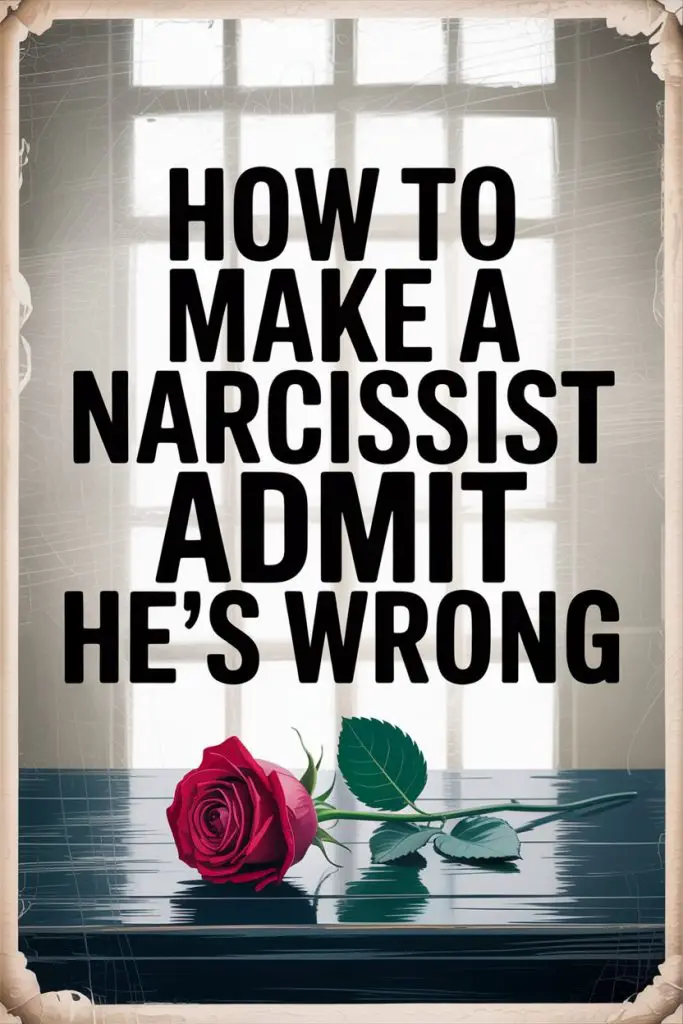There it is, the Mount Everest of relationship challenges: coaxing a narcissist into admitting fault.
Maybe you like a challenge. Maybe you’re just tired of arguing with someone who’d sooner wrestle a crocodile than mutter the words, “I was wrong.” Either way, you’re here—hats off for your courage (or your stubborn streak).
Is it possible? Yes, though you might reach enlightenment first.
But if you’re game for a waltz with the world’s slipperiest ego, let’s talk tactics that mix empathy, boundaries, and—just a pinch—of cunning.
Recognizing What You’re Up Against
Before plotting your course, it helps to identify the beast. Narcissists aren’t garden-variety stubborn; we’re talking about folks who’d rather eat a shoe than admit to a minor error.
Their sense of self is about as fragile as a glass slipper at a rugby match.
What does this mean for you? Expect resistance. Expect theatrics.
Expect the conversation to detour through every childhood trauma he’s ever had—none of which justifies parking in the neighbour’s flower bed, but here we are.
Spot the signs: deflection, blame-shifting, rewriting history like a rejected soap opera script. Once you see it, you can stop banging your head on the wall and start strategizing.
Picking the Right Moment
Timing is everything. Walk up to a narcissist during a heated row and request accountability, and you might as well ask a cat to do your taxes.
Pick a calm moment, when nobody’s blood pressure is through the roof and his ego’s not already licking its wounds.
Look for a window when life’s humming along—he’s had his coffee, his team’s just won, maybe he’s even made a show of helping out around the house (for the praise, naturally). Your odds improve when he’s riding high.
The Art of the Non-Attack
Anybody will bristle at direct confrontation, but narcissists take it to Olympic levels. Phrase things gently.
Swap “You were wrong” for “I felt hurt when…” or “I noticed this happened, and it affected me.” Less courtroom, more confessional.
Keep your voice even, your language neutral. The goal isn’t to win a debate—it’s to sidestep his defences entirely.
If you must, practice in front of a mirror, or the dog (who probably admits to more wrongdoing than your partner anyway).
Appealing to His Self-Interest
Now comes the fun part. Narcissists like to win. They like to be seen as clever, noble, magnanimous. Appeal to that.
Suggest that admitting to a small mistake actually makes him look strong, honest, even admirable. (Is it manipulative? Maybe. But if politicians can do it, why not you?)
Try: “It takes guts to own up—people respect that.” Or, “You always say you value honesty, and that’s one of the things I love about you.”
Lay it on thick. If there’s ever a time to channel your inner soap star, this is it.
Give Him Room to Save Face
Picture this: you’re cornered, embarrassed, and all eyes are on your every move. That’s how a narcissist feels when faced with proof he’s wrong. The trick is to offer an exit ramp.
Frame the error as something anyone could have made: “That could happen to anyone, honestly.” Or, “There was a lot going on, who wouldn’t slip up?”
He’s much more likely to fess up if he isn’t forced to eat humble pie in front of an audience.
Avoid the Blame Game
The minute you point fingers, his internal lawyer springs into action. Suddenly, you’re not arguing about the dirty dishes—you’re defending your entire existence.
Keep things focused on the issue, not his character. “The bin didn’t go out” is manageable.
“You never care about me” is an invitation to an all-night blame-a-thon. Spare yourself the reruns.
Stick to the Facts
When dealing with a master deflector, facts are your best friend. Keep things specific and concrete. “On Tuesday, you said you’d pick up the kids and then forgot.” Not, “You’re always unreliable.”
Details make it harder for him to wriggle out or twist the narrative. If he starts rewriting history, a gentle, “I remember it differently” works better than calling him a liar (tempting, but counterproductive).
Reinforce Positive Behavior
Catch him in a rare admission? Throw a parade. Well, maybe not, but definitely offer some positive reinforcement. “Thanks for owning up, it means a lot to me.” Or, “I really appreciate you seeing my side.”
A little ego stroke now and then can work wonders. Pavlov would be proud.
Know When to Walk Away
Sometimes, you could recite the facts, craft the world’s softest pitch, offer him a medal for honesty—and he’ll still double down.
In those cases, it’s not about you or your skills; it’s about his bottomless need for self-protection.
If you notice the argument looping into infinity, or your own sanity circling the drain, step back.
Protect your peace. Some battles just aren’t worth your energy (or your rapidly multiplying grey hairs).
Boundaries Aren’t Just a Buzzword
Repeatedly bashing your head against the wall isn’t self-care. If he never admits fault, and it’s starting to chip away at your self-esteem, it’s time for boundaries.
This doesn’t mean issuing ultimatums from on high. Think: “I need accountability in my relationships. If I can’t get that, I have to reconsider what I put up with.”
It’s not emotional blackmail—it’s self-respect, plain and simple.
When to Call in Reinforcements
Sometimes, a neutral third party can perform miracles. Couples counselling isn’t just for dramatic breakups or people on reality TV.
A skilled therapist can help mediate, spotlight patterns, and shift the dynamic—sometimes just by having a witness in the room.
Narcissists often behave better when someone else is watching. Funny how that works.
If All Else Fails
There will be times when you’ve tried everything short of hiring a skywriter, and he still can’t admit to misplacing the remote, let alone a major misstep.
If you’re stuck replaying the same script, it might be time to ask the tough questions.
Is this relationship feeding your soul—or draining it dry? Not every narcissist is a lost cause, but some are simply allergic to accountability.
If your happiness is permanently on the back burner, you deserve better.
Admitting Wrong Isn’t the End of the World
Getting a narcissist to see the error of his ways can feel like winning the lottery—rare, exhilarating, and a little bit surreal. But it’s not impossible, especially if you’re patient, strategic, and a touch devious.
At the end of the day, his willingness to admit fault reflects him—not you. Whether he comes around, or you decide to stop chasing the apology, remember: your sanity is worth more than any hollow victory in an ego contest.
Sometimes, the bravest thing is knowing when to let go—and treating yourself with the honesty you wish you got from him.
And if you ever figure out how to get a narcissist to say “I’m sorry” twice in the same week, write it down. That recipe’s worth its weight in gold.


